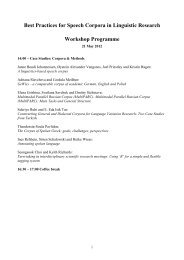96 • 2011 - Hamburger Zentrum für Sprachkorpora - Universität ...
96 • 2011 - Hamburger Zentrum für Sprachkorpora - Universität ...
96 • 2011 - Hamburger Zentrum für Sprachkorpora - Universität ...
You also want an ePaper? Increase the reach of your titles
YUMPU automatically turns print PDFs into web optimized ePapers that Google loves.
Multilingual Resources and Multilingual Applications - Regular Papers<br />
Terms Correct Incorrect Accuracy<br />
Generation Generation<br />
Development Set 400 376 24 94%<br />
parse failure: 19<br />
wrong parse: 5<br />
Test Set 50 48 2 98%<br />
parse failure: 1<br />
wrong parse: 1<br />
Table 1: Evaluation results for French from the development set and test set<br />
adjectives can be handled by the XLE grammar. Lexicon<br />
entries like grand, e or grand/e or grand(e) are parsed<br />
and will result in the same output grand, grande, grands,<br />
grandes.<br />
Lastly, dealing with unknown words is supported in XLE<br />
in a way that parts of a multi-word term that do not<br />
undergo inflection may be analyzed and regenerated<br />
verbatim. This is useful for the treatment of postnominal<br />
prepositional phrases.<br />
The use of a full-blown grammar engineering framework<br />
for the generation of inflected term variants might be<br />
seen as too much machinery at first sight. However, the<br />
experience we gained with this approach is definitely<br />
positive. Despite the expressivity of the framework, the<br />
processing time needed for the processing of one<br />
multi-word term is about 200ms on an AMD Opteron<br />
2200 MHz. Given the fact that our service is only called<br />
when an entry is created by a glossary author, this<br />
performance is adequate.<br />
2.2.1. French multi-word terms<br />
As French is more analytic than German, compounding is<br />
less prominent. The words in a multi-word term are<br />
syntactically depending on each other and require<br />
syntactic processing. The most common construction for<br />
multi-word terms is a noun combined with a preposition<br />
and a noun phrase (e.g. droit de l’individu). Such<br />
constructions typically correspond to German<br />
compounds. Each noun may be modified by one or more<br />
adjectives. For a correct generation of all inflected<br />
variants, the core noun and its core adjectives have to be<br />
identified, as these are the only parts to be altered for<br />
inflected variants. The core part of a French multi-word<br />
term is typically the one preceding the preposition (e.g.<br />
droit de l’individu → droits de l’individu). Due to this<br />
fact, even terms with unknown words can be handled as<br />
long as they follow the preposition. In our XLE grammar,<br />
a default parsing strategy for unknown words occurring<br />
after a preposition is built-in and for the generation side<br />
such input is copied unchanged.<br />
Further constructions for multi-word terms are: a noun<br />
with one or more adjectives, expressions with a hyphen<br />
(e.g. éthylène-glycol), noun-noun combinations (e.g.<br />
assurance maladie) or combinations of several nouns<br />
with et or ou (e.g. cause et effet). For our development set<br />
of 400 terms (see section 3.1.1 for further details), we get<br />
the following distribution: terms with prepositions (190),<br />
terms with adjectives (183), noun-noun combinations<br />
(16), terms with hyphens (9), combination of type noun et<br />
noun (2).<br />
2.2.2. Preference heuristics for French<br />
If the parsing of a one-word input term results in<br />
ambiguous structures, nouns are preferred to adjectives<br />
and verbs, as glossary entries often are nouns. For<br />
ambiguous structures of multi-word input terms the<br />
sequence noun-adjective is preferred to noun-noun, e.g.<br />
église moderne = noun + adjective instead of noun +<br />
noun. If a term is a combination of two nouns, only the<br />
first one is inflected, e.g. assurance maladie →<br />
assurances maladie.<br />
In expressions with a hyphen, inflection is carried out by<br />
treating the hyphenated part of the term as normal word:<br />
Core adjectives or nouns with a hyphen are inflected, all<br />
others are not, e.g. éthylène-glycol → éthylène-glycols,<br />
or document quasi-négociable → documents quasinégociables.<br />
In these two examples, the second part of<br />
the hyphenated expression is a core noun and has to be<br />
inflected. But there are cases where both parts of the<br />
hyphenated expression are non-core nouns. They are not<br />
inflected as in the example égalité homme-femme →<br />
égalités homme-femme. This example follows the<br />
35



